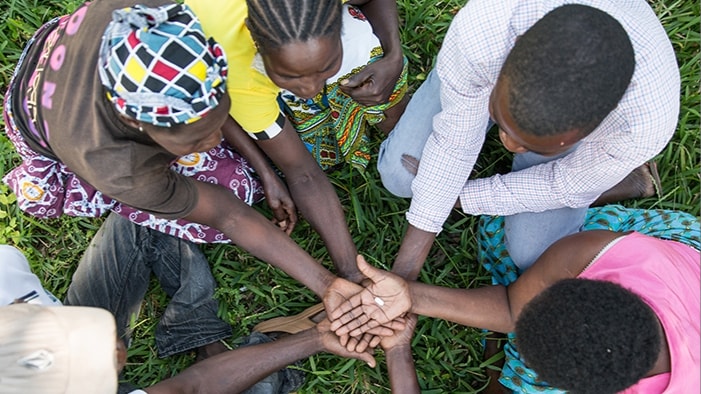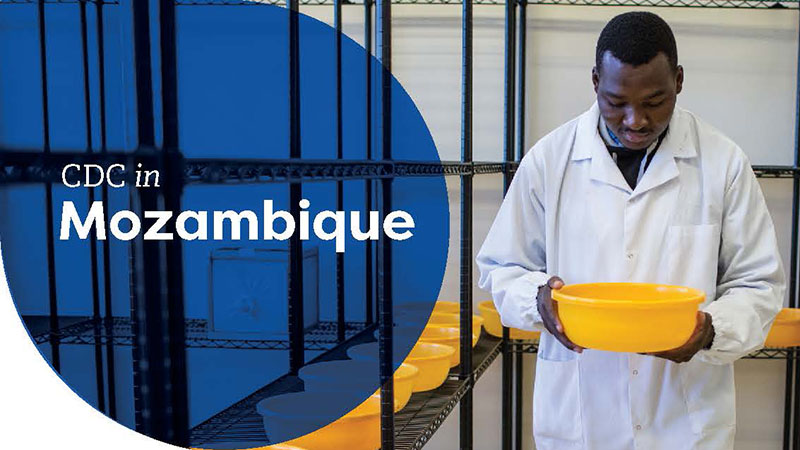At a glance
CDC works with the Ministry of Health (MOH) and other partners to build effective public health collaboration and partnerships, which strengthen the country's core public health capabilities: data and surveillance, laboratory capacity, workforce and institutions, prevention and response, innovation and research, and policy, communications, and diplomacy.

Overview

CDC established an office in Mozambique in 2000. CDC works with the Government of Mozambique (GRM) and partner organizations to detect, prevent, and control infectious disease outbreaks, and build and strengthen the country's core public health capabilities. These include data and surveillance, laboratory capacity, workforce and institutions, prevention and response, innovation and research, and policy, communications, and diplomacy. Public health key priorities include addressing global health security, HIV, tuberculosis (TB), malaria, cholera, influenza, polio, COVID-19, and other public health threats.
Global health security
CDC works with MOH to strengthen health systems. Priorities include building capacity in human resources for health (HRH), public health infrastructure, health information systems, surveillance, and laboratory systems. These systems are essential for outbreak preparedness and response and for delivering high-quality HIV and TB prevention and treatment services. CDC activities include:
- Supporting strengthened capacity, sustainability, and effectiveness of HRH.
- Strengthening laboratory infrastructure, services, and systems for HIV and TB diagnostics and treatment monitoring.
- Supporting NPHI’s capacity for multi-disease testing, surveillance, and outbreak preparedness and response.
- Enhancing the availability, accessibility, quality, and use of program and public health data.
- Strengthening electronic health and laboratory information systems, including those for HIV and TB.
- Conceptualizing research, conducting population-based and behavioral surveys, and strengthening disease surveillance.
- Promoting a country-owned, sustainable, and resilient health system.
Workforce development
CDC helped Mozambique establish a Field Epidemiology Training Program (FETP) in 2010. FETP helps increase the country's capacity to investigate and respond to disease outbreaks.
FETP trains participants in applied epidemiology, laboratory management, data collection, and translation of data into evidence-based action. As part of their training, FETP fellows support MOH and NPHI with HIV and TB surveillance, monitoring, and evaluation. FETP in Mozambique strengthens district-level epidemiologic capacity and is comprised of three levels:
- Frontline/basic (3 months), launched in 2021.
- Intermediate (9 months), started in 2022.
- Advanced (2 years), initiated in 2010.
FETP graduates supported the national COVID-19 response. Activities included investigating cases and deaths, assessing contact tracing effectiveness, and assessing compliance with quarantine and isolation. In recent years, FETP graduates also supported outbreak investigations and emergency response efforts following natural disasters, such as cyclones Idai, Kenneth, Ana, and Freddy.
Emergency response
CDC strengthens local capacity to prevent, detect, and respond to infectious disease outbreaks and other public health threats. Investments in NPHI build upon HIV investments to strengthen NPHI’s ability to coordinate key public health functions. Functions include surveillance, laboratory systems, outbreak investigations and response, public health data use and communications, and public health research.
In addition, CDC supports GRM to rapidly respond to public health emergencies, including the COVID-19, polio, and cholera responses. Activities have included:
- Strategic planning and coordination.
- Disease surveillance.
- Laboratory testing and quality assurance.
- Infection prevention and control.
- Vaccination campaigns.
- Continuity of essential health services and clinical care.
- Water, sanitation, and hygiene interventions.
Key accomplishments
- Six reference laboratories have achieved international ISO15189 accreditation.
- Since 2010, about 150 professionals have graduated from the FETP program.
- In 2022, FETP Advanced received accreditation from the Training Programs in Epidemiology and Public Health Interventions Network. The accreditation confirms Mozambique's alignment with quality training standards and increases recognition of FETP's value in supporting the country's public health priorities.
- CDC helped establish a distance learning platform in Mozambique, known as Telesaude. Telesaude provides case management support using hotlines and distance learning for training and mentoring activities.
HIV and TB
As a key implementer of the U.S. President's Emergency Plan for AIDS Relief (PEPFAR), CDC plays an essential role in the fight against HIV and TB. With unmatched scientific and technical knowledge and long-standing relationships with ministries of health, CDC is uniquely positioned to advance HIV, TB, and other global health security activities that keep Americans safe at home and abroad.
Through PEPFAR, CDC provides critical support to Mozambique's public health infrastructure, improving the country's ability to prevent, detect, and respond to HIV, TB, and other infectious diseases and minimizing their risk from entering the U.S.
Malaria
Mozambique faces a significant malaria risk, with its entire 32 million population vulnerable, particularly in the central and northern regions. CDC has collaborated with MOH, NPHI and other partners to support implementation of malaria prevention and control activities in Mozambique since 2007. These efforts aim to decrease malaria-related illness and deaths in the country, particularly in the provinces of Zambezia, Nampula, and Manica.
CDC-supported activities have included providing technical input in:
- Indoor residual spraying.
- Mosquito monitoring to understand insecticide susceptibility, behavior, and population.
- Providing malaria tests, antimalarials, and malaria preventive treatments.
- Ensuring quality care of people with malaria.
- Drug resistance monitoring to ensure antimalarials remain effective.
- Supply chain management.
- Social and behavioral change.
Key accomplishments
Since 2007, CDC's support has helped deliver:
- 16.8 million mosquito nets, which has led to a fivefold increase in homes with at least one net.
- 16 million malaria preventive treatments in pregnancy.
- Over 110 million rapid diagnostics tests and 89 million fast-acting malaria medicines.
Influenza
Influenza viruses require continued vigilance to protect the world from seasonal influenza and novel strains that could trigger a pandemic.
CDC has worked with the GRM to help build surveillance and laboratory capacity to detect and respond to influenza. This platform was leveraged and expanded to include COVID-19 and respiratory syncytial virus.
Mozambique participates in the World Health Organization's External Quality Assessment Project for influenza laboratories. The project helps strengthen diagnostic capacity and preparedness to respond to influenza outbreaks worldwide by monitoring quality and performance standards.
Poliovirus outbreak response
Mozambique faces significant challenges in maintaining routine immunization rates. The country is the current epicenter of a wild poliovirus outbreak, with two concurrent vaccine-derived poliovirus outbreaks ongoing.
CDC continues to support the nationwide polio response as a key partner in the Global Polio Eradication Initiative. CDC has deployed epidemiologists and scientists to priority provinces to help detect polio cases and plan, implement, and monitor campaigns. Additionally, residents and graduates of Mozambique's CDC-supported FETP have deployed nationwide to support active case finding and campaign monitoring.
CDC's activities to prevent polio and respond to polio outbreaks include:
- Strengthening polio case finding, contract tracing and surveillance.
- Coordinating and implementing vaccination campaigns.
- Implementing vaccine uptake monitoring.
